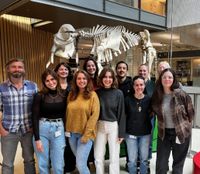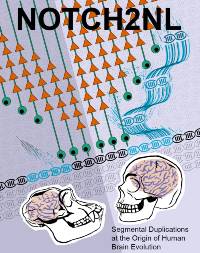Evolutionary Neurogenomics
In the Jacobs Lab we investigate how genomic evolution has shaped and rewired gene regulatory networks involved in human brain development.
Genomic changes can be small, such as retrotransposon insertions, or big, such as segmental duplications of whole segments of the genome. Genomic modifications happened frequently during primate evolution, but the extent to which individual evolutionary genomic events accounted for changes in gene expression and contributed to the evolution of species remains unclear. The impact of both types of evolutionary genomic changes on human brain development and disease are the main topics in my lab's research:
Segmental duplications as source for new human-specific genes
In work that was recently published in 'Cell' after many years of exciting discoveries, we revealed the existence of a cluster of human-specific genes, which are highly expressed in neuronal stem cells in the human brain. These human-specific genes were formed by segmental duplications, and their function in neuronal progenitor cells suggest these genes may have contributed to the evolutionary expansion of the human neocortex https://www.cell.com/cell/abstract/S0092-8674(18)30383-0
Transposable elements and KRAB Zinc fingers; Evolutionary cat and mouse game leading to increased genomic complexity
In previous work (Jacobs et al., 2014; Nature) we showed how KRAB zinc finger genes in our genome are in a continuous battle against retrotransposon invasions, revealing how our genome is actually in a war against itself. As a result of this evolutionary armsrace, both retrotransposons and KRAB zinc finger genes become heavily integrated in pre-existing gene regulatory networks, adding an extra level of complexity to how, where and when genes in our genome are shut on or off.
Evolutionary arms race between KRAB zinc finger genes and Retrotransposons. The ongoing battle within ourselves, driving genomes to become increasingly complex, as they evolve mechanisms to fight off ever-changing elements of their own DNA.
Our lab currently investigates how this extra layer of retrotransposon-mediated gene control has re-shaped gene regulatory networks involved in human brain development. Our research aims to pinpoint how specific classes of transposable elements have contributed to the evolution of human neuronal gene expression networks and understand how these changes may relate to human's increased susceptibility to neurodevelopmental disorders such as Autism and Schizophrenia and human neurodegenerative diseases such as Alzheimer's and Parkinson's disease.
The Jacobs Lab 2018



